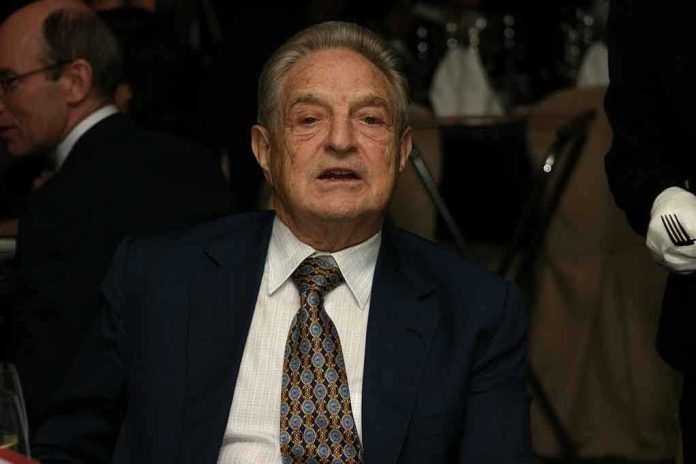
The president’s call for criminal charges against a prominent philanthropist exposes the relentless use of unproven accusations as a political weapon, deepening conservative frustrations over unchecked influence and a lack of accountability.
Story Snapshot
- Donald Trump publicly demanded criminal prosecution of George Soros and his son, fueling ongoing debates about elite influence and protest movements.
- No evidence has emerged to support the allegations, and authorities have not pursued charges or investigations.
- Soros’s foundation remains under scrutiny, with right-wing media amplifying claims of left-wing activism and unrest.
- The controversy highlights continued polarization, the power of political rhetoric, and conservative concerns over the erosion of American values.
Trump’s Public Accusation and Its Political Context
Donald Trump issued a public statement demanding criminal charges against billionaire philanthropist George Soros and his son, Alexander. Trump alleged—without providing evidence—that the Soros family orchestrated violent protests across the United States. The claim was immediately amplified by conservative media, tapping into longstanding frustration among conservatives who believe elite figures are undermining national stability and traditional values. Despite the outcry, U.S. authorities have not launched any official investigations or filed charges related to Trump’s demand.
Trump’s statement was not isolated but part of a broader pattern in which Soros is regularly accused by segments of the right of funding or directing left-wing activism. For years, Soros’s support for liberal causes—through the Open Society Foundations (OSF)—has made him a lightning rod for criticism. Right-wing commentators and politicians often use Soros’s name to symbolize the threat of globalism, unchecked financial influence, and what they characterize as “woke” agendas. These narratives resonate with many conservatives who see such influence as undermining American sovereignty and constitutional principles, particularly when linked to unrest or policy shifts that threaten family values, gun rights, and national security.
The Soros Legacy: Philanthropy, Influence, and Conspiracy Claims
George Soros, a Hungarian-American financier, began his philanthropic efforts in 1979, funding scholarships for Black students in apartheid South Africa and supporting dissidents in Communist Eastern Europe. Over decades, his Open Society Foundations have grown into one of the world’s largest private funders for groups promoting democracy, human rights, and civil society, with operations in more than 120 countries. Soros’s high-profile giving and explicit support for progressive policies have repeatedly drawn accusations—almost always unsubstantiated—of orchestrating protests or manipulating outcomes to destabilize conservative governments and values.
Despite frequent claims, including those relating to Black Lives Matter and migrant caravans, independent fact-checkers and investigative journalists consistently find no credible evidence linking Soros or his son to illegal protest activity or violence. The OSF maintains a policy of transparency, publishing annual reports and grant data. Nevertheless, the persistent public suspicion—especially among conservative audiences—reflects deep-seated concerns over the impact of financially powerful individuals and organizations on American politics and society.
No Official Action and the Power of Polarization
Following Trump’s 2024 statement, there has been no movement from U.S. law enforcement or the judiciary to open investigations or pursue charges against either George or Alexander Soros. The absence of official action has not diminished the story’s prominence in political discourse, as right-wing media outlets continue to highlight Soros as a symbol of elite interference and the erosion of foundational American principles. For many conservatives, the lack of accountability for perceived wrongdoing by powerful figures remains a source of anger, reinforcing calls for stronger oversight and the restoration of constitutional checks and balances.
Meanwhile, the OSF has continued its philanthropic initiatives, recently appointing Binaifer Nowrojee as its new president. The Soros family and OSF leadership have denied any involvement in orchestrating protests, emphasizing their commitment to legal and transparent activity. Yet, the allegations serve to further polarize the public, intensifying scrutiny of civil society organizations and fueling broader mistrust of institutions perceived as advancing left-leaning or globalist agendas.
Long-Term Implications for Civil Society and Political Discourse
The ongoing use of unproven allegations against Soros and his family exemplifies how political rhetoric can entrench conspiracy narratives and deepen national divides. In the short term, these stories increase media attention and public scrutiny, sometimes resulting in security risks for targeted individuals. In the long term, the cycle of accusation and denial can chill philanthropic engagement, hinder civil society’s ability to operate, and perpetuate a culture of suspicion—especially when prominent figures are seen as immune from legal consequences. As Soros continues to be invoked as a symbol of left-wing influence, conservatives remain alert to any developments that could further undermine constitutional protections or traditional American values.
Sources:
Open Society Foundations: Our History
Wikipedia: Open Society Foundations
Open Society Foundations and George Soros




